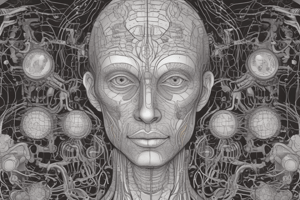Podcast
Questions and Answers
Which hormone stimulates the thyroid gland to produce thyroxin and triiodothyronine?
Which hormone stimulates the thyroid gland to produce thyroxin and triiodothyronine?
- LH
- ACTH
- TSH (correct)
- FSH
What is the primary function of ADH?
What is the primary function of ADH?
- Regulation of calcium levels
- Stimulation of melanin production
- Water conservation and blood pressure regulation (correct)
- Regulation of growth
Which of the following hormones has an antagonistic effect on parathyroid hormone?
Which of the following hormones has an antagonistic effect on parathyroid hormone?
- Oxytocin
- Insulin
- Glucagon
- Calcitonin (correct)
Which gland produces parathormone?
Which gland produces parathormone?
What is the primary function of FSH and LH?
What is the primary function of FSH and LH?
Which of the following hormones increases the sensitivity of the sympathetic nervous system?
Which of the following hormones increases the sensitivity of the sympathetic nervous system?
What is the primary function of oxytocin?
What is the primary function of oxytocin?
Which of the following cells produce insulin?
Which of the following cells produce insulin?
What is the primary function of hormones in the body?
What is the primary function of hormones in the body?
How do hormones produced in endocrine glands reach their target cells?
How do hormones produced in endocrine glands reach their target cells?
What is the key difference between the nervous system and the endocrine system?
What is the key difference between the nervous system and the endocrine system?
Which of the following is an example of antagonism in hormones?
Which of the following is an example of antagonism in hormones?
Where is the hypothalamus located?
Where is the hypothalamus located?
What is the function of the hypothalamus in relation to the pituitary gland?
What is the function of the hypothalamus in relation to the pituitary gland?
What is the function of the anterior pituitary gland?
What is the function of the anterior pituitary gland?
How do nerves stimulate endocrine glands to produce and secrete hormones?
How do nerves stimulate endocrine glands to produce and secrete hormones?
Study Notes
Hormone Definition and Production
- A hormone is produced in an endocrine gland, secreted into the bloodstream, and transported to target cells, where it binds to receptors and exerts its effect.
- Hormones are produced in endocrine glands, released into the bloodstream, and transported to target cells, where they bind to receptors and exert their effect.
Nervous System vs. Endocrine System
- The nervous system and endocrine system work together to regulate body functions.
- The nervous system stimulates a body function, and the endocrine system responds by releasing hormones.
- The nervous system is faster, but its effects are short-term, while the endocrine system is slower, but its effects are long-term.
Hormone Stimulation
- An endocrine gland can be stimulated to produce and release hormones through:
- Nerve impulses directly on the cell
- Stimulation from a higher-level hormone
- Chemical stimulation
- Physical stimulation
Antagonism
- Antagonism is the interaction of two substances with opposing effects.
- Example: Parathyroid hormone (regulates calcium levels in the blood) and calcitonin (antagonist) have opposing effects on calcium levels.
Hypothalamus
- The hypothalamus is located in the stalk of the brain, connected to the pituitary gland through the infundibulum.
- It gives orders to the pituitary gland and enables it to respond to nerve impulses.
Pituitary Gland
- The pituitary gland is located in the stalk of the brain, connected to the hypothalamus through the infundibulum.
- It is divided into an anterior lobe (adenohypophysis) and a posterior lobe (neurohypophysis).
- The anterior lobe releases 7 hormones, while the posterior lobe releases 2 hormones.
Hormone Functions
- FSH and LH stimulate the gonads to produce sex hormones.
- TSH stimulates the thyroid gland to produce thyroxine and triiodothyronine.
- ACTH stimulates the adrenal cortex to produce cortisol and sex hormones.
- Growth hormone stimulates the liver to produce growth factors.
- Prolactin stimulates the mammary glands.
- MSH stimulates melanocytes.
- ADH stimulates water conservation and blood pressure increase.
- Oxytocin stimulates uterine contractions.
Thyroid Gland
- The thyroid gland is located in front of the trachea, below the laryngeal prominence.
- It is composed of small follicles.
- It produces thyroglobulin, which is converted to T3 and T4 under the influence of TSH.
- It also produces calcitonin, which lowers calcium levels.
Thyroid Hormone Functions
- T3 and T4 stimulate the body's metabolism.
- They increase the sensitivity of the sympathetic nervous system.
- Calcitonin lowers calcium levels.
Parathyroid Glands
- There are 4 parathyroid glands located behind the thyroid gland.
- They produce parathyroid hormone, which regulates calcium levels in the blood by:
- Extracting calcium from bones
- Increasing calcium reabsorption in the kidneys
- Activating vitamin D
- Increasing calcium absorption from food
Insulin and Glucagon
- Insulin and glucagon are produced in the Langerhans islets of the pancreas.
- Insulin is produced in beta cells and lowers blood sugar levels.
- Glucagon is produced in alpha cells and raises blood sugar levels.
Studying That Suits You
Use AI to generate personalized quizzes and flashcards to suit your learning preferences.
Description
Learn about the definition and function of hormones, produced in endocrine glands, transported through blood, and bind to receptors in target cells to exert their effects.




